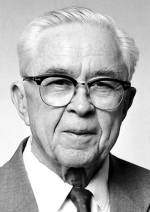Edward B. Lewis (May 20, 1918 – July 21, 2004) was an American geneticist, a corecipient of the 1995 Nobel Prize in Physiology or Medicine.
Lewis was born in Wilkes-Barre, Pennsylvania and graduated from E. L. Meyers High School. He received a BA in Biostatistics from the University of Minnesota in 1939, where he worked on Drosophila melanogaster in the lab of C.P. Oliver. In 1942 Lewis received a Ph.D. from California Institute of Technology (Caltech), working under the guidance of Alfred Sturtevant. After serving as a meteorologist in the U.S. Air Force in World War II, Lewis joined the Caltech faculty in 1946 as an instructor. In 1956 he was appointed Professor of Biology, and in 1966 the Thomas Hunt Morgan Professor of Biology. Among his many awards were the Thomas Hunt Morgan Medal (1983), the Gairdner Foundation International award (1987), the Wolf Foundation prize in medicine (1989), the Rosenstiel award (1990), the National Medal of Science (1990), the Albert Lasker Award for Basic Medical Research (1991), and the Louisa Gross Horwitz Prize (1992).
His Nobel Prize winning studies with Drosophila, (including the discovery of the Drosophila Bithorax complex and elucidation of its function), founded the field of developmental genetics and laid the groundwork for our current understanding of the universal, evolutionarily conserved strategies controlling animal development. He is credited with development of the complementation test. His key publications in the fields of genetics, developmental biology, radiation and cancer are presented in the book Genes, Development and Cancer, which was released in 2004.
Effects of radiation
During the 1950s, Dr. Lewis studied the effects of radiation from X-rays, nuclear fallout and other sources as possible causes of cancer. He reviewed medical records from survivors of the atomic bombings of Hiroshima and Nagasaki, as well as radiologists and patients exposed to X-rays. Lewis concluded that "health risks from radiation had been underestimated". Dr. Lewis published articles in Science and other journals and made a presentation to a Congressional committee on atomic energy in 1957.
At the scientific level of the debate, the crucial question was whether the "threshold theory" was valid or whether, as Lewis insisted, the effects of radioactivity were "linear with no threshold", where every exposure to radiation had a long-term cumulative effect.
The issue of linearity versus threshold re-entered the debate on nuclear fallout in 1962, when Ernest Sternglass, a Pittsburgh physicist, argued that the linearity thesis was confirmed by the research of Alice Stewart.
Interviews
On November 20, 2001 Dr. Lewis was interviewed by Dr. Elliot Meyerowitz in the Kerckhoff Library at the California Institute of Technology, Pasadena, California. This interview was released on DVD in 2004 as "Conversations in Genetics: Volume 1, No. 3 - Edward B. Lewis; An Oral History of Our Intellectual Heritage in Genetics" 67 min; Producer Rochelle Easton Esposito; The Genetics Society of America.
(photo source www.liveinternet.ru)


























